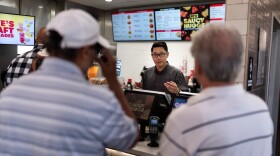San Diego fans are probably feeling a bit of Charger fever after the Bolts’ Monday night victory over arch rivals The Raiders. But the new film “Big Fan” (opening September 18 at Landmark’s Ken Cinema) looks at the darker side of sports obsessions.
Meet Paul (Patton Oswalt) from Staten Island. He’s in his thirties, he still lives at home with his mom, and he works as an attendant in a parking lot. He’s also a football fan. In fact being a fan of the New York Giants defines Paul.
We find him sitting in his toll booth at an underground parking garage rehearsing what he’ll say on a talk radio show later that night. He scripts out what he’s going to say in a lined notebook but never lets on how much work he puts into it. When his one friend (Kevin Corrigan) asks him if he knows what he’s going to say when he calls in, Paul pretends that he’s just going to wing it. But he meticulous plans not only what he’s going to say but rehearses how he’s going to say it.

If you’ve ever listened to a sports call in show, you’ve probably heard fans like Paul. But Paul is about to stand out from the rest of the obsessive fan base after he follows a beloved N.Y. Giants football player to a club one night. He tries to buy the guy a drink but ends up freaking the guy out once he reveals that he’s been following him around the entire evening. The player reacts by beating Paul to a pulp. Now Paul faces a dilemma: if he presses charges his team’s star player will be unable to play the rest of the season jeopardizing the Giants’ chance of making the playoffs.
“Big Fan” marks the directing debut of writer Robert D. Siegel. Siegel looked to the seamier side of sports with his first filmed screenplay, “The Wrestler,” just last year. In both “The Wrestler” and now “Big Fan,” Siegel reveals a feel for people living on the fringes. In “The Wrestler,” Mickey Rourke was an aging and down on his luck wrestler, and in “Big Fan,” Patton Oswalt the fan who lives for football. Both could easily become pathetic stereotypes but in Siegel’s hands they become something more. Neither film sets up the main character as an object of ridicule. We may think of the wrestling circuit as a joke but Rourke’s character is vividly real and sympathetic.
Similarly, Oswalt’s Paul is easy to make fun of yet Siegel affords him a certain dignity. In addition, Siegel doesn’t present his characters as victims but rather as people who make conscious decisions that determine their destinies. We may not always value their choices but for better or worse they are living the lives they choose to live. So while Paul’s family endlessly nags him about his lack of ambition and failure to get married, he actually seems content with who he is. He doesn’t even seem bitter that he can only watch his team in the parking lot of the stadium where they play.

Siegel gets Paul’s lower middle class environment down pat, and he can be ruthless in evaluating it as in a scathing scene with Paul’s mother. Mom also humiliates Paul when she interrupts his call to the sports radio show. Her nagging interruption plays like an homage to Martin Scorsese’s “The King of Comedy” in which Robert DeNiro’s wanna be stand up comedian lives in his mom’s basement and has his routines interrupted by his mother calling him from upstairs and yelling at him to keep it down.
The opening scene of “Big Fan,” with Oswalt’s voiceover and pencil scrawled thoughts in a notebook, recalls another Scorsese film, “Taxi Driver.” Like Travis, Paul is wound a bit too tight and desperately wants to be noticed or to make some mark. The end of “Big Fan” continues the “Taxi Driver” allusions in the way Paul plans out a cathartic revenge that’s uniquely his own. Siegel obviously admires Scorsese’s early work and although Siegel doesn’t have Scorsese’s incendiary talent he does share some similar interests and sensibilities. (There’s also a funny bit involving Paul’s ambulance chasing lawyer brother who makes a TV spot that inspires the mother to compare her son to Scorsese.)
“Big Fan” requires a careful balancing act and at times Siegel comes up a bit short. A more seasoned director could have probably paced the film better, keeping all three acts more finely tuned. But Siegel does manage an impressive balancing act. At times he makes his film painfully brutal at other times it feels like a savage black comedy. Yet Siegel never lets Paul become a mere character type. He’s a flesh and blood character who makes decisions for himself, and Siegel at least respects him for that. But Siegel also shows that Paul is clearly off-putting, and not someone we’d really want to know or be friends with.
Patton Oswalt delivers a stellar performance. His Paul is someone who gets kicked around by everyone from his mom to his brother to his NFL hero. He conveys the torment Paul goes through as he tries to reconcile that his idol just beat the crap out of him and that despite that he can’t bear to do anything to hurt his beloved Giants. Unlike other comedians who turn to drama (Robin Williams, Adam Sandler), he doesn’t go too somber to play Paul. He retains an energy and passion that can be funny as well as disturbing. Maybe the point of the film is that Paul’s obsessive fandom is a form of insanity.
“Big Fan” (rated R for language and some sexuality) may have a hard time finding fans. There’s not enough sports to qualify as a sports film and satisfy that audience. But there’s probably too much of the sports milieu to make it immediately appealing to art house crowds. Plus it’s too dark for mainstream mall audiences.
Companion viewing: “The Wrestler,” “The Fan,” “The Onion Movie” (Siegel worked at "The Onion")






